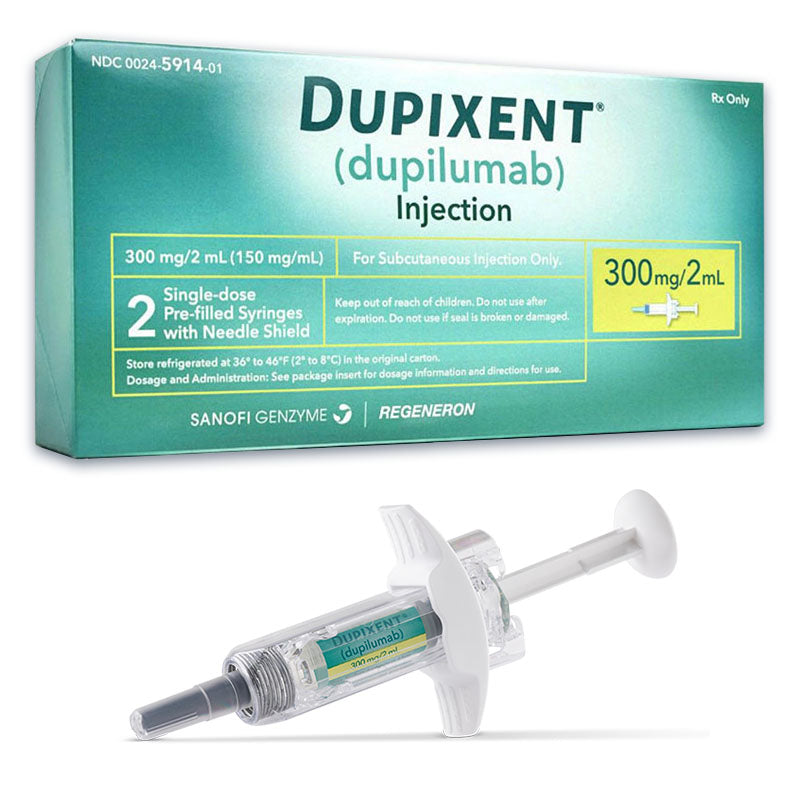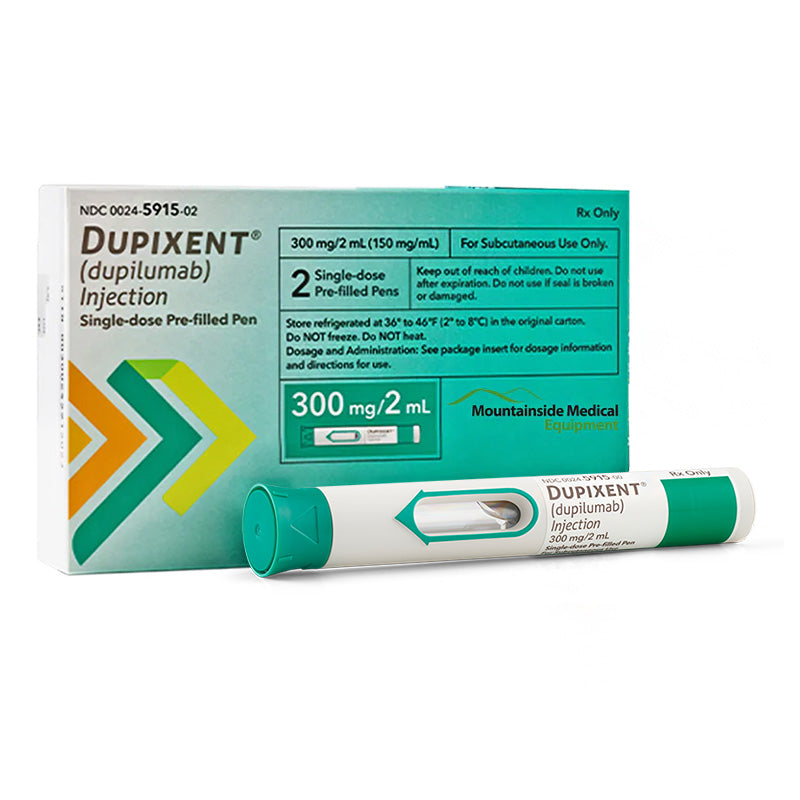SANOFI REGENERON
Dupixent (Dupilumab)
Dupixent (Dupilumab)


Couldn't load pickup availability
What is this medication?
DUPIXENT is an interleukin-4 receptor alpha antagonist indicated:
- Atopic Dermatitis for the treatment of adult and pediatric patients aged 6 months and older with moderate-to-severe AD whose disease is not adequately controlled with topical prescription therapies or when those therapies are not advisable. DUPIXENT can be used with or without topical corticosteroids.
- Asthma as an add-on maintenance treatment of adult and pediatric patients aged 6 years and older with moderate-to-severe asthma characterized by an eosinophilic phenotype or with oral corticosteroid dependent asthma.
Limitations of Use:
- Not for the relief of acute bronchospasm or status asthmaticus.
- Chronic Rhinosinusitis with Nasal Polyposis as an add-on maintenance treatment in adult patients with inadequately controlled chronic rhinosinusitis with nasal polyposis (CRSwNP).
- Eosinophilic Esophagitis for the treatment of adult and pediatric patients aged 12 years and older, weighing at least 40 kg, with eosinophilic esophagitis (EoE).
- Prurigo Nodularis for the treatment of adult patients with prurigo nodularis (PN).
How does this medication work?
DUPIXENT works by blocking two proteins that contribute to a type of inflammation that plays a major role in atopic dermatitis, asthma, chronic rhinosinusitis with nasal polyposis, eosinophilic esophagitis, and prurigo nodularis.
What should I watch for while using this medication?
Before using DUPIXENT, tell your healthcare provider about all your medical conditions, including if you:
- have eye problems.
- have a parasitic (helminth) infection.
- are scheduled to receive any vaccinations. You should not receive a ″live vaccine″ right before and during treatment with DUPIXENT.
- are pregnant or plan to become pregnant. It is not known whether DUPIXENT will harm your unborn baby. Pregnancy Exposure Registry. There is a pregnancy exposure registry for women who use DUPIXENT during pregnancy. The purpose of this registry is to collect information about the health of you and your baby. Your healthcare provider can enroll you in this registry. You may also enroll yourself or get more information about the registry by calling 1-877-311-8972 or going to https://mothertobaby.org/ongoing-study/dupixent/.
- are breastfeeding or plan to breastfeed. It is not known whether DUPIXENT passes into your breast milk.
Tell your healthcare provider about all of the medicines you take, including prescription and over-the-counter medicines, vitamins, and herbal supplements.
- Especially tell your healthcare provider if you:
- are taking oral, topical, or inhaled corticosteroid medicines
- have asthma and use an asthma medicine
- have atopic dermatitis, chronic rhinosinusitis with nasal polyposis, eosinophilic esophagitis, or prurigo nodularis and also have asthma
Do not change or stop your corticosteroid medicine or other asthma medicine without talking to your healthcare provider. This may cause other symptoms that were controlled by the corticosteroid medicine or other asthma medicine to come back.
How should I use this medication?
- See the detailed ″Instructions for Use″ that comes with DUPIXENT for information on how to prepare and inject DUPIXENT and how to properly store and throw away (dispose of) used DUPIXENT pre-filled syringes and pre-filled pens.
- Use DUPIXENT exactly as prescribed by your healthcare provider.
- Your healthcare provider will tell you how much DUPIXENT to inject and how often to inject it.
- DUPIXENT comes as a single-dose pre-filled syringe with needle shield or as a pre-filled pen. „ The DUPIXENT pre-filled pen is only for use in adults and children 2 years of age and older. „ The DUPIXENT pre-filled syringe is for use in adults and children 6 months of age and older.
- DUPIXENT is given as an injection under the skin (subcutaneous injection).
- If your healthcare provider decides that you or a caregiver can give the injections of DUPIXENT, you or your caregiver should receive training on the right way to prepare and inject DUPIXENT.Do not try to inject DUPIXENT until you have been shown the right way by your healthcare provider. In children 12 years of age and older, it is recommended that DUPIXENT be given by or under the supervision of an adult. In children 6 months to less than 12 years of age, DUPIXENT should be given by a caregiver.
- If your dose schedule is every week and you miss a dose of DUPIXENT: Give the DUPIXENT injection as soon as possible and start a new every week dose schedule from the time you remember to take your DUPIXENT injection.
- If your dose schedule is every other week and you miss a dose of DUPIXENT: Give the DUPIXENT injection within 7 days from the missed dose, then continue with your original schedule. If the missed dose is not given within 7 days, wait until the next scheduled dose to give your DUPIXENT injection.
- If your dose schedule is every 4 weeks and you miss a dose of DUPIXENT: Give the DUPIXENT injection within 7 days from the missed dose, then continue with your original schedule. If the missed dose is not given within 7 days, start a new every 4 week dose schedule from the time you remember to take your DUPIXENT injection.
- If you inject too much DUPIXENT (overdose), get medical help or contact a Poison Center expert right away at 1-800-222-1222.
- Your healthcare provider may prescribe other medicines to use with DUPIXENT. Use the other prescribed medicines exactly as your healthcare provider tells you to.
How should I store this medication?
- Store DUPIXENT in the refrigerator at 36°F to 46°F (2°C to 8°C).
- Store DUPIXENT in the original carton to protect from light.
- DUPIXENT can be stored at room temperature up to 77°F (25°C) up to 14 days. Throw away (dispose of) any DUPIXENT that has been left at room temperature for longer than 14 days.
- Do not heat or put DUPIXENT into direct sunlight.
- Do not freeze.
- Do not shake.
- Keep DUPIXENT and all medicines out of the reach of children.
What are the possible side effects of using this medication?
DUPIXENT can cause serious side effects, including:
- Allergic reactions. DUPIXENT can cause allergic reactions that can sometimes be severe. Stop using DUPIXENT and tell your healthcare provider or get emergency help right away if you get any of the following signs or symptoms:
- breathing problems or wheezing
- fast pulse
- fever
- general ill feeling
- swollen lymph nodes
- swelling of the face, lips, mouth, tongue, or throat
- hives
- itching
- nausea or vomiting
- fainting, dizziness, feeling lightheaded
- joint pain
- skin rash
- cramps in your stomach-area
- Eye problems. Tell your healthcare provider if you have any new or worsening eye problems, including eye pain or changes in vision, such as blurred vision. Your healthcare provider may send you to an ophthalmologist for an eye exam if needed.
- Inflammation of your blood vessels. Rarely, this can happen in people with asthma who receive DUPIXENT. This may happen in people who also take a steroid medicine by mouth that is being stopped or the dose is being lowered. It is not known whether this is caused by DUPIXENT. Tell your healthcare provider right away if you have:
- rash
- worsening shortness of breath
- persistent fever
- chest pain
- a feeling of pins and needles or numbness of your arms or legs
- Joint aches and pain. Joint aches and pain can happen in people who use DUPIXENT. Some people have had trouble walking or moving due to their joint symptoms, and in some cases needed to be hospitalized. Tell your healthcare provider about any new or worsening joint symptoms. Your healthcare provider may stop DUPIXENT if you develop joint symptoms.
- The most common side effects of DUPIXENT include:
- injection site reactions
- upper respiratory tract infections
- eye and eyelid inflammation, including redness, swelling, and itching, sometimes with blurred vision
- herpes virus infections
- common cold symptoms (nasopharyngitis)
- cold sores in your mouth or on your lips
- high count of a certain white blood cell (eosinophilia)
- dizziness
- muscle pain
- diarrhea
- pain in the throat (oropharyngeal pain)
- gastritis
- joint pain (arthralgia)
- trouble sleeping (insomnia)
- toothache
- parasitic (helminth) infections
- The following additional side effects have been reported with DUPIXENT:
- facial rash or redness
Tell your healthcare provider if you have any side effect that bothers you or that does not go away. These are not all of the possible side effects of DUPIXENT. Call your doctor for medical advice about side effects. You may report side effects to FDA at 1-800-FDA-1088.




